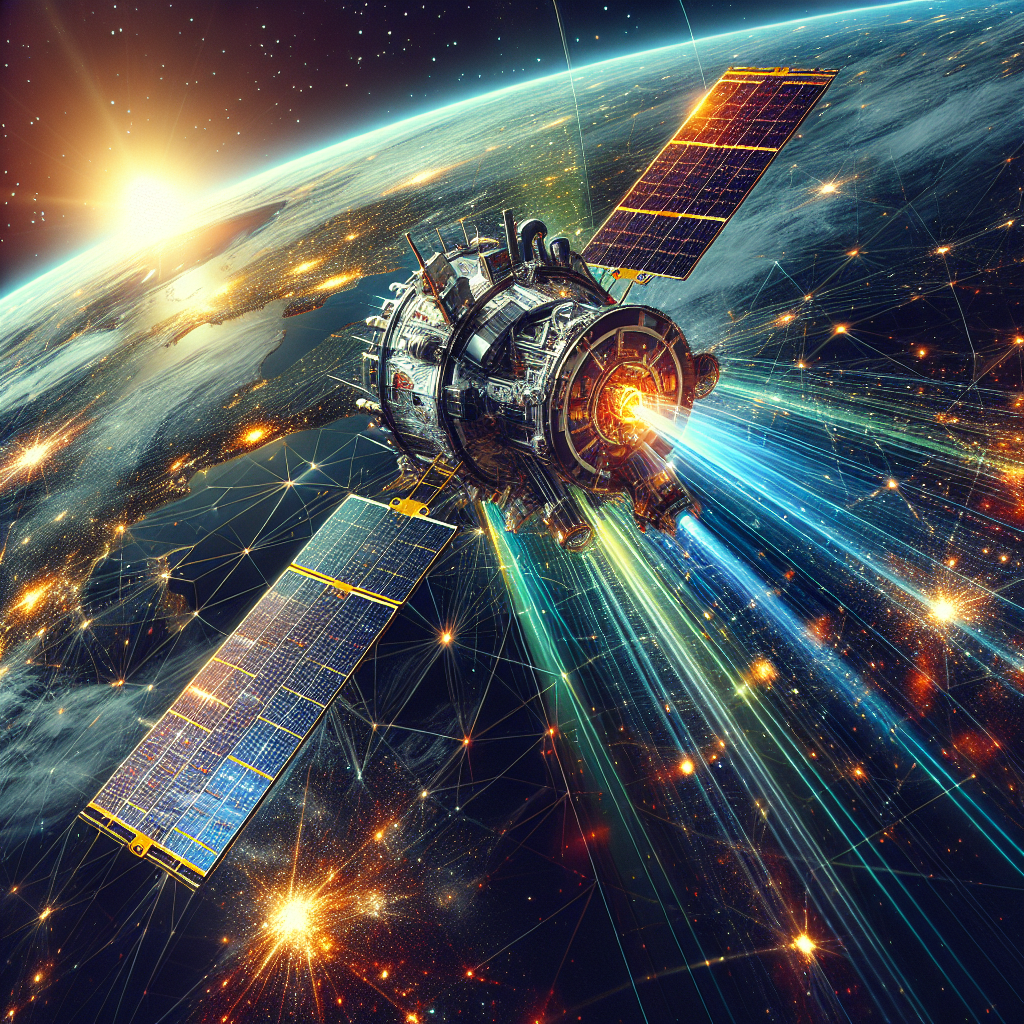In this article, we delve into the exciting world of aerospace and satellite technology, specifically focusing on the potential of Google Cloud Platform (GCP) in revolutionizing this industry. With its advanced capabilities and cutting-edge innovations, GCP has become a game-changer in solving complex challenges and maximizing the efficiency of space-related operations. From satellite imagery analysis to spacecraft simulation and beyond, join us as we explore the limitless possibilities that GCP brings to the forefront of space exploration and innovation.

Introduction to GCP for Aerospace and Satellite
Overview of GCP
In today’s technology-driven world, the aerospace and satellite industry is constantly pushing boundaries and exploring new frontiers. To support these advancements, organizations in this sector require robust and scalable cloud computing solutions. One such solution that has gained significant traction in recent years is Google Cloud Platform (GCP). GCP offers a wide range of services and products specifically designed to meet the unique challenges and requirements of the aerospace and satellite industry.
Importance of GCP in Aerospace and Satellite Industry
The aerospace and satellite industry operates in an environment that demands high computing power, secure data storage, efficient data processing, and advanced analytics capabilities. GCP addresses these needs and provides organizations with the tools and infrastructure required to develop and deploy cutting-edge solutions. From satellite data processing and analysis to spacecraft system management, GCP offers a multitude of benefits that enhance operational efficiency, cost-effectiveness, and innovation in the aerospace and satellite industry.
GCP Benefits for Aerospace and Satellite Industry
Scalability and Flexibility
The ability to scale computing resources based on demand is of utmost importance in the aerospace and satellite industry. Whether it is handling massive amounts of data generated by satellites or rapidly scaling up computational power for complex simulations, GCP offers scalable solutions that can meet the industry’s requirements. With GCP’s flexible infrastructure, organizations can adjust their computing resources in real-time, ensuring optimal performance and resource utilization.
Cost-effectiveness
Cost efficiency is a critical factor for organizations in the aerospace and satellite industry, especially considering the high expenses associated with developing and operating satellites and spacecraft. GCP offers a pay-as-you-go pricing model, allowing organizations to only pay for the resources they use. This eliminates the need for upfront investments in costly infrastructure and reduces operational expenses. Additionally, GCP’s efficient resource management capabilities enable organizations to optimize spending and allocate resources more effectively, further enhancing cost-effectiveness.
Advanced Analytics and Machine Learning
GCP’s suite of advanced analytics and machine learning tools enables organizations in the aerospace and satellite industry to derive valuable insights from vast amounts of data. From predictive maintenance to anomaly detection, machine learning algorithms can be trained on GCP to identify patterns and improve operational efficiency. Furthermore, GCP’s data analytics capabilities enable organizations to perform complex data processing tasks, such as image recognition or climate modeling, quickly and efficiently.
Security and Data Privacy
In an industry where sensitive data related to national security and proprietary research is involved, security and data privacy are paramount. GCP offers robust security features, including encryption at rest and in transit, as well as access controls and identity management. Additionally, GCP’s compliance certifications and adherence to security standards provide organizations in the aerospace and satellite industry with the assurance that their data is protected. GCP’s global infrastructure also ensures data resilience and availability, mitigating the risk of data loss or downtime.

Use Cases of GCP in Aerospace and Satellite
Satellite Data Processing and Analysis
The vast amount of data generated by satellites requires powerful computing capabilities for processing and analysis. GCP’s compute infrastructure, coupled with its data analytics tools like BigQuery and Cloud Dataflow, enables organizations to efficiently handle large volumes of satellite data. This facilitates timely and accurate processing, leading to improved decision-making and enhanced operational efficiency.
Satellite Communication and Connectivity
Reliable and efficient communication is crucial for satellite missions, whether it is for transmitting telemetry data or enabling real-time command and control functionalities. GCP provides reliable and scalable networking solutions that ensure seamless connectivity between ground stations, satellites, and spacecraft. Through the use of GCP’s networking services, organizations can establish secure and high-speed communication links, enabling efficient communication and reliable data transfer.
Spacecraft Systems Management
Managing the various systems and components of spacecraft necessitates sophisticated software and infrastructure. GCP’s Compute Engine and Kubernetes Engine provide organizations with the tools to efficiently manage spacecraft systems, monitor health, and perform diagnostics. This allows for proactive maintenance and monitoring, significantly reducing the risk of system failures and maximizing the lifespan of spacecraft.
Earth Observation and Climate Monitoring
Satellites play a vital role in monitoring Earth’s climate and gathering data for climate modeling. GCP’s advanced analytics capabilities, combined with its computing and storage infrastructure, enable organizations to process and analyze satellite imagery and climate data at scale. This facilitates accurate weather forecasting, climate modeling, and environmental monitoring, contributing to scientific research and sustainable development efforts.
Spacecraft Avionics and Navigation
Precise avionics and navigation systems are critical for the success of spacecraft missions. GCP’s AI and machine learning tools can be leveraged to enhance spacecraft navigation, enabling autonomous operations and improved trajectory planning. By integrating GCP’s machine learning models with spacecraft avionics systems, organizations can improve navigation accuracy, reduce fuel consumption, and enhance mission success rates.
GCP Services and Products for Aerospace and Satellite
Compute Engine and Kubernetes Engine
GCP’s Compute Engine offers a scalable and flexible infrastructure for running virtual machines (VMs) in the cloud. This allows organizations to deploy and manage their compute resources at scale, ensuring high-performance computing for aerospace and satellite applications. Additionally, GCP’s Kubernetes Engine provides a container orchestration platform, enabling organizations to efficiently manage and scale containerized applications in the cloud.
Cloud Storage and Data Transfer
GCP’s Cloud Storage offers secure and durable object storage for storing and retrieving large amounts of data. Organizations can leverage this service to efficiently store and manage satellite imagery, telemetry data, and other mission-critical information. GCP’s Data Transfer service also facilitates efficient and secure data transfer between on-premises systems and cloud storage, enabling seamless integration and data synchronization.
BigQuery and Cloud Dataflow
GCP’s BigQuery is a fully managed data warehouse solution that enables organizations to analyze massive datasets quickly. Aerospace and satellite organizations can leverage BigQuery to perform complex queries on satellite data, climate models, and other large datasets, enabling data-driven insights and decision-making. Additionally, GCP’s Cloud Dataflow provides a managed service for real-time data processing and analysis, facilitating near-real-time monitoring and analysis of satellite telemetry data.
AI and Machine Learning Tools
GCP offers a comprehensive set of AI and machine learning tools that enable organizations in the aerospace and satellite industry to develop and deploy intelligent applications. Services like AutoML and AI Platform enable organizations to train and deploy custom machine learning models for various applications, including anomaly detection in satellite telemetry or image recognition in satellite imagery. GCP’s AI and machine learning tools empower organizations to extract meaningful insights from their data and drive innovation.
Security and Compliance Solutions
GCP provides robust security and compliance solutions to protect sensitive data in the aerospace and satellite industry. Services like Cloud Key Management Service (KMS) and Identity and Access Management (IAM) enable organizations to secure their data and control access to resources. GCP’s compliance certifications, such as ISO 27001 and SOC 2, ensure that organizations comply with industry regulations and maintain data privacy and security standards.

Case Studies of GCP Implementation in Aerospace and Satellite
NASA’s Earth Observing System Data and Information System
NASA’s Earth Observing System Data and Information System (EOSDIS) leverages GCP’s scalable infrastructure and data analytics capabilities to manage and distribute Earth science data. GCP enables NASA to efficiently process and analyze vast amounts of satellite data, facilitating research on climate change, land use, and other critical environmental factors. The partnership between NASA and GCP has revolutionized data management and analysis in the Earth observation domain.
SpaceX’s Starlink Satellite Internet
SpaceX’s Starlink project aims to provide global broadband internet coverage using a large constellation of satellites. GCP plays a crucial role in the Starlink project by providing reliable and scalable infrastructure for the operation of the satellite network. GCP’s networking capabilities and data storage solutions enable efficient data transmission and management, ensuring seamless internet connectivity for users around the world.
European Space Agency’s Gaia Mission
The European Space Agency’s Gaia mission aims to create the most detailed 3D map of our galaxy by observing and cataloging billions of stars. GCP’s advanced analytics and machine learning tools are utilized to process and analyze the massive amounts of data generated by the Gaia satellite. This allows scientists to derive valuable insights about the structure, evolution, and history of our Milky Way galaxy, contributing to our understanding of the universe.
Planet Labs’ Satellite Imaging Constellation
Planet Labs operates a large constellation of Earth-imaging satellites that capture daily imagery of the entire planet. GCP’s scalable infrastructure and data processing capabilities enable Planet Labs to efficiently process and analyze petabytes of satellite imagery data. GCP’s machine learning tools are also leveraged to automate image analysis, enabling rapid identification of changes on Earth’s surface and providing valuable insights for applications such as agriculture, forestry, and environmental monitoring.
Challenges and Considerations in Adopting GCP for Aerospace and Satellite
Regulatory and Legal Compliance
The aerospace and satellite industry operates in a highly regulated environment, necessitating compliance with various legal and regulatory frameworks. Organizations adopting GCP must ensure that their usage of cloud services meets the specific requirements and guidelines set forth by regulatory authorities. This includes data privacy, export control, and intellectual property protection regulations. A thorough understanding of these compliance factors is crucial to ensure a successful and compliant implementation of GCP in the industry.
Data Transfer and Connectivity Issues
The aerospace and satellite industry relies heavily on reliable data transfer and connectivity between ground stations, satellites, and other systems. Organizations must assess their data transfer requirements and evaluate GCP’s networking capabilities to ensure seamless and efficient communication. Connectivity issues can arise due to various factors such as latency, bandwidth constraints, and signal interference. It is important to design and implement robust network architectures to mitigate potential connectivity challenges when adopting GCP.
Security and Cyber Threats
As with any cloud-based solution, security is a top concern for organizations in the aerospace and satellite industry. While GCP offers robust security features, organizations must also implement additional security measures to protect their sensitive data and systems. This includes implementing encryption, access controls, and authentication mechanisms. Regular monitoring, vulnerability assessments, and incident response plans are also crucial to mitigate the risk of cyber threats and unauthorized access.
Skills and Training Requirements
Adopting GCP in the aerospace and satellite industry requires a skilled workforce capable of managing and utilizing the platform effectively. Organizations need to invest in training programs and skill-building initiatives to ensure that employees have the necessary technical expertise to leverage GCP’s services and products. Collaborating with GCP-certified professionals and engaging in knowledge-sharing forums can help organizations overcome the skills gap and maximize the benefits of GCP.
Cost and Budget Allocation
While GCP offers cost-effective solutions, organizations must carefully consider their budget allocation and cost management strategies. The aerospace and satellite industry requires substantial investments, and proper allocation of resources is essential for success. It is crucial to evaluate the total cost of ownership, including not only the cost of GCP services but also the costs associated with data transfer, storage, and compute resources. Organizations must optimize their resource usage and scalability to ensure cost-efficiency when adopting GCP.

Future Trends and Opportunities for GCP in Aerospace and Satellite
Integration of Edge Computing and IoT
The integration of edge computing and IoT (Internet of Things) devices presents new opportunities for the aerospace and satellite industry. GCP’s edge computing capabilities enable organizations to process data closer to the source, reducing latency and enabling real-time decision-making. By leveraging GCP’s IoT services and edge computing infrastructure, organizations can enhance satellite operations, enable autonomous missions, and unlock new insights from real-time data.
Autonomous Satellite Operations and Missions
Advancements in AI and machine learning open doors for autonomous operations and missions in the aerospace and satellite industry. GCP’s AI and machine learning tools can be leveraged to develop autonomous systems that enable satellites to make decisions and adapt to changing conditions without human intervention. This can lead to increased operational efficiency, reduced human error, and improved mission success rates.
Cloud-based Space Traffic Control
With the increasing number of satellites and space debris, managing space traffic has become a critical challenge. GCP’s cloud-based infrastructure provides a scalable and secure platform for space traffic management. By leveraging GCP’s advanced analytics capabilities and machine learning algorithms, organizations can develop cloud-based space traffic control systems that enable efficient and safe management of orbital assets.
Collaborative Data Sharing and Collaboration
GCP’s collaborative and data-sharing capabilities enable organizations in the aerospace and satellite industry to collaborate effectively and share data for research purposes. By leveraging GCP’s data analytics and storage solutions, organizations can securely share and analyze large datasets, encouraging collaboration and knowledge sharing across the industry. This fosters innovation and accelerates scientific advancements in space exploration and research.
Conclusion
In conclusion, GCP offers numerous benefits and opportunities for the aerospace and satellite industry. From scalability and cost-effectiveness to advanced analytics and security, GCP’s comprehensive suite of services and products cater to the industry’s unique needs. Through real-world case studies, we have seen how organizations like NASA, SpaceX, and the European Space Agency have successfully leveraged GCP to revolutionize their operations, expand their capabilities, and contribute to scientific research. While challenges such as regulatory compliance and skills requirements exist, the future holds promising trends such as edge computing integration, autonomous operations, and cloud-based space traffic control. By embracing GCP, organizations in the aerospace and satellite industry can unlock new possibilities and drive innovation. We encourage all stakeholders in the industry to explore the potential of GCP and embark on their journey towards a more efficient, secure, and data-driven future in space exploration and satellite technology.

